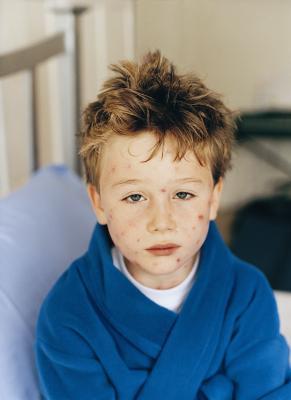When you think of herpes, your first thought may be the dreaded, incurable sexually transmitted disease. There are actually eight types of herpes viruses that typically cause infection in humans, from the virus that causes cold sores to the viruses that cause common childhood rashes. The various viruses cause a range of ailments, from the mild cold sore to the rather unpleasant chickenpox.
Common Types of Herpes Virus in Children
Herpes simplex 1 causes cold sores to form on a person’s mouth. Children typically catch the virus while they are young and then carry it with them for the rest of their lives. Another type of herpes virus, Varicella Zoster, is responsible for chickenpox. Like herpes simplex, the virus stays in a child’s body even after he recovers from the effects. Some people who had chickenpox as children may develop shingles from the same virus, as adults. Herpes virus 6 causes roseola, a rash that is common in young children. Epstein Barr virus, another type of herpes, is responsible for diseases such as mononucleosis.
Symptoms
Symptoms vary depending on the type of herpes a child has. Symptoms of chickenpox include a blistery red rash over a child’s face, chest and back, according to the Mayo Clinic. The child may also have a fever and stomach pain. The primary symptoms of roseola is a pink, patchy rash and a high fever. A red blister that ultimately scabs over is a symptom of herpes simplex 1. Children with mononucleosis experience extreme feelings of fatigue, a fever and sore throat, according to the Merck Manual.
Risks
While most children recover from chickenpox, roseola or mononucleosis, a few may develop complications. Older children and teenagers as well as infants are at risk for complications from chickenpox such as pneumonia or a skin infection. The fever brought on by roseola may trigger a seizure in some children, according to the Mayo Clinic. Cold sores can lead to skin infections if a child has a weak or undeveloped immune system, according to Kids Health. Although rare, Epstein Barr virus may cause seizures, brain damage or meningitis.
Treatment Options
Since herpes is a virus, it cannot be treated or cured with antibiotics. Most childhood illnesses caused by herpes do not have a specific course of treatment, other than rest, medications to bring down a fever and creams to soothe the pain of the rash. Sometimes, a doctor may give a child an antiviral medicine for chickenpox, but only if that child is at risk for developing complications.
Prevention
If your child has not had chickenpox yet, you may want to get him vaccinated. Vaccines do not exist for the other types of herpes viruses. Your best bet is to keep your child away from others who have symptoms of chickenpox, roseola or mononucleosis. Since Epstein Barr and cold sores are commonly spread by kissing and saliva exchange, advise your child not to kiss anyone with symptoms and not to share drinking cups or utensils with them.





